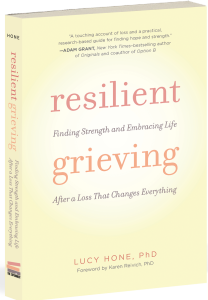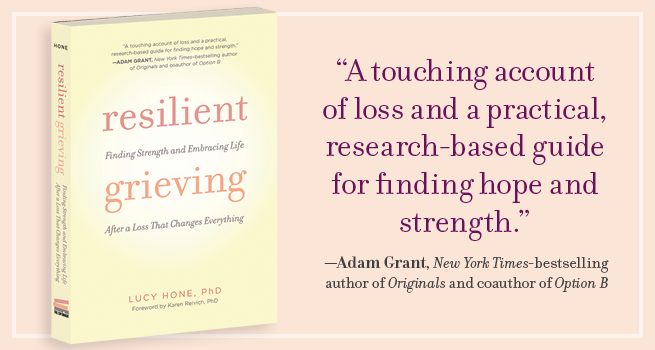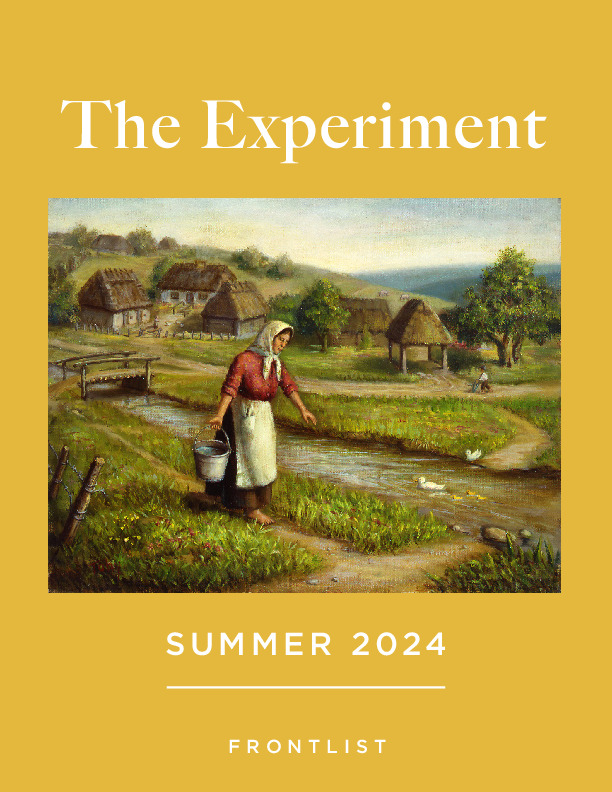Whether it be a grief of our own or that of a friend or family member, it is a fact of life that all of us, at some point in our lives, will have to come to terms with grief. In an article for the medicine journal BJM, Collin Murray Parks, a consultant psychiatrist, describes the different kinds of loss we may encounter: “separations from loved others, incapacitation, bereavement, migration, relocation, job losses, birth of a baby, retirement, and professional loss.” While most might think that such life-changes are the exclusive domain of adults, children are as likely to experience loss too. As the Childhood Bereavement Network points out, in one survey alone 78% of children indicated that they had already suffered a loss of a relative or friend.

Loss is clearly unavoidable at all stages of life, and by extension grief must be too—but of what does grieving consist and how should, or even can, we handle it?
In Resilient Grieving, Lucy Hone, PhD, is here to tell us that we can—not only that, but that there is a way to cope with loss that can empower and encourage us to move forward with strength and, eventually, to embrace life again. It is inspired by not only years of research, but also Hone’s own journey through a devastating loss when, in 2014, her 12-year-old daughter was killed in a car accident. Discouraged by the prevailing Kübler-Ross model of grief—which tends to focus on types and stages of grief rather than strategies to cope with it—she decided to approach her own devastating loss from the perspective of research she knew the benefits of: resilience science.
At its core, “resilient grieving” defies the prevailing assumption that the grieving process should be incapacitating. Life goes on whether we’re ready or not—from children and partners to our demanding jobs, many people depends on us and require our attention even when tragedy strikes. As the National Alliance for Grieving Children points out, kids especially need their family in times of distress: “When asked what the most helpful things were after the death of their family member, 55% said spending time with family.” With this in mind, Hone’s mission is to show readers a way to grieve that allows you to be in control of, rather than be controlled by, the process.
In the first half of the book, Hone walks you through the stages of recovery from topics like “Six strategies for coping in the immediate aftermath” to accepting loss—even tips for distracting yourself and managing exhaustion through rest and exercise. But it’s the second half of the book that tackles perhaps the hardest part: how to make sense and fully come to terms with your world after its been turned upside down. Hone provides insight into subjects like “Facing the future” and “Post-traumatic growth”—all geared toward helping the aggrieved find ways to slowly, healthily move on in the midst of great sorrow.
What’s more, Hone also has advice for anyone who’s needed to offer comfort to the bereaved and not known how to tactfully do so. Chapter 10: “Relationships (and what friends and family can do to help)” demonstrates Hone’s method of providing advice grounded in personal experience. Here, for example, is a very helpful list of what not to say to the bereaved:
Inappropriate Things to Say to the Bereaved
- At least she’s in a better place now. Better? Really? She liked it here, on earth, living with us and all her friends.
- Are you feeling better yet? It’s not a disease; it’s not something I’m going to “get over” because it’s not temporary.
- I know how you feel—my dog/hamster died last year. No comment.
- Everything happens for a reason. “Let me be crystal clear: If you’ve faced a tragedy and someone tells you in any way, shape, or form that your tragedy was meant to be, that it happened for a reason, that it will make you a better person, or that taking responsibility will fix it, you have every right to remove them from your life,” writes blogger Tim Lawrence. For the record, let me also be crystal clear: I also don’t believe everything happens for a reason. I don’t believe I am a better person because I’ve had to change my life as a result of losing Abi; I’m not trying to coerce you into becoming a better person via the strategies in this book either. I merely believe that, faced with circumstances beyond my control, I’ve been forced to take a new life path, to relearn the world. Do I welcome it? No. Has finding new directions helped me get through the pain and emptiness of losing my daughter? Yes.
- You’ll be united up in heaven. If you’re going to say this, please be sure the person believes this. I (sadly) don’t, so this offers me no comfort at all. Instead, I really have to accept that Abi is gone forever and that I’m not going to see her again. Along the same lines, there’s something profoundly inappropriate and irritating about teenagers’ posts asking “Are you having fun up there in heaven, Abi?” on Instagram or Facebook.
- It’ll be okay. I kind of know it will, but I don’t want this to be okay.
Non-supportive behaviors:
- changing the subject
- talking too much about yourself
- asking “why” questions
- preaching or lecturing
- asking too many questions.
Whether you’re grieving, know someone who is, or want to know how to truly be there for someone when tragedy strikes—Resilient Grieving is a guide for learning how to find strength in the midst of hopelessness from a woman who’s been there and survives to tell her tale so that you may grow in resilience too.
Additional Bereavement Resources:
Bereaved Parents of the USA: https://bereavedparentsusa.org/
Open to Hope: http://www.opentohope.com/
Widow’s Hope: http://www.widowshope.org/
HealGrief: https://healgrief.org/
Resilient Grieving is available now wherever books are sold.





